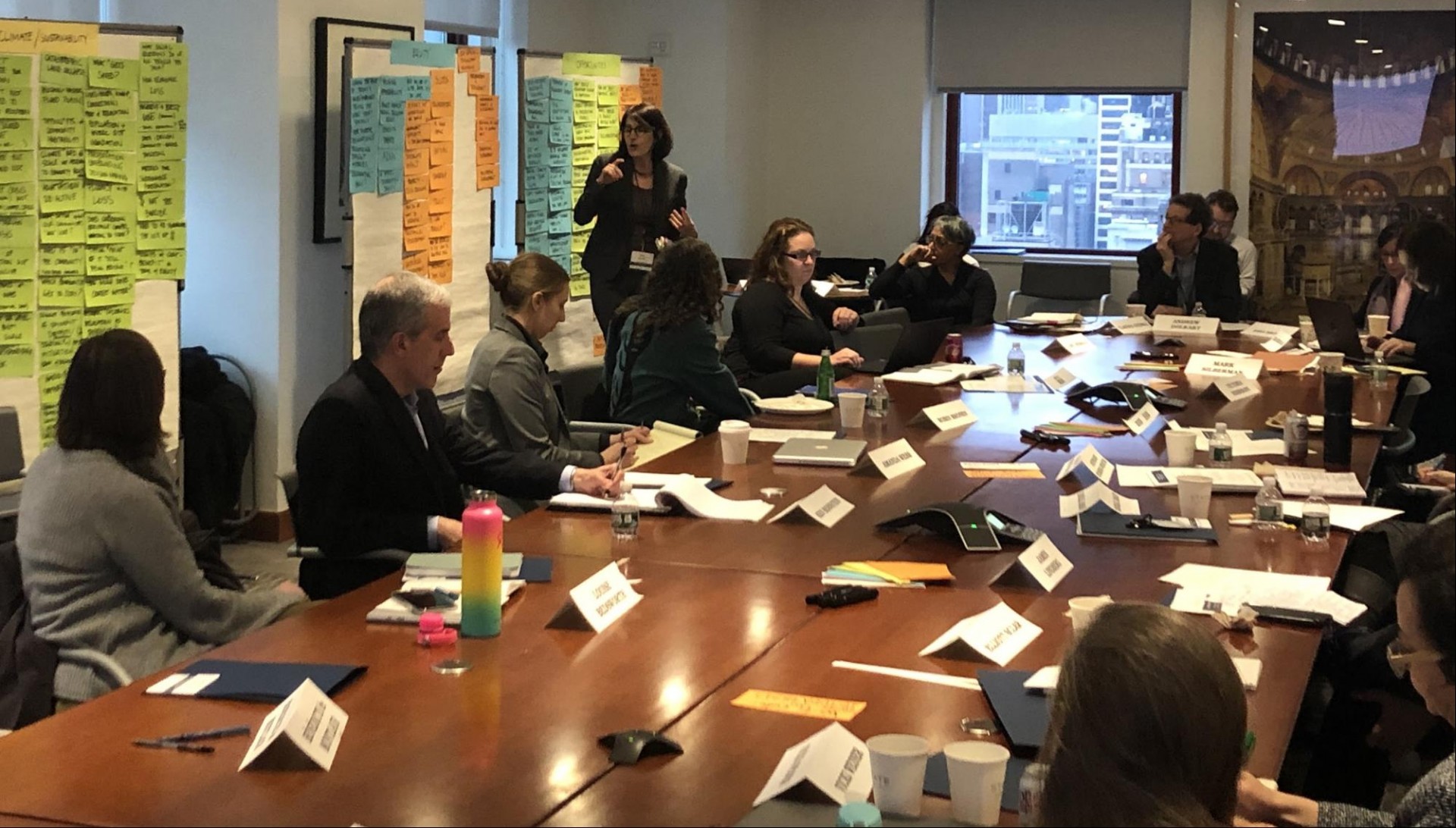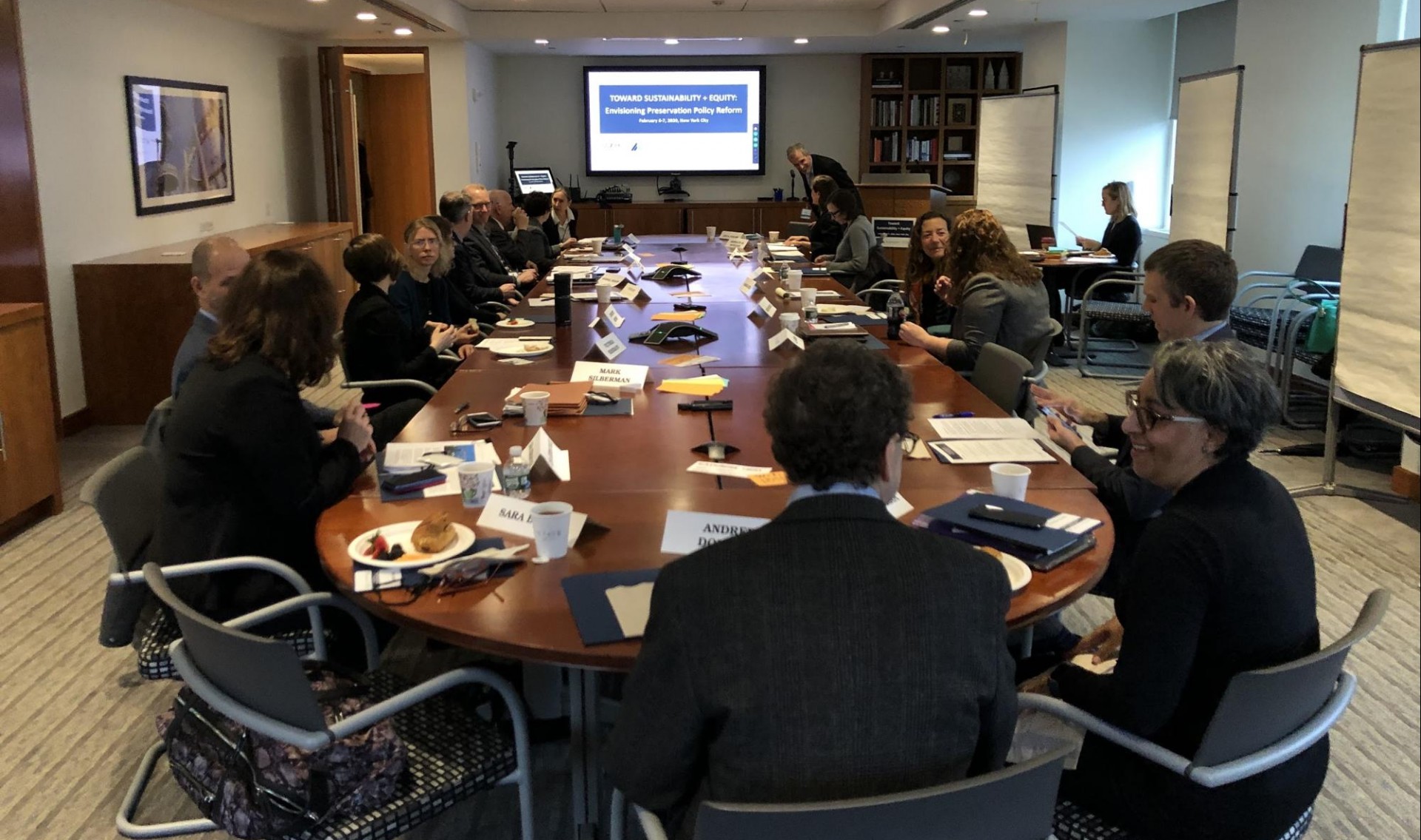This collaborative project of CSUD, the Columbia Graduate School of Architecture, Planning, and Preservation, and The American Assembly, examines historic preservation as a sustainable and socially-inclusive urban policy tool. It has been generously funded by the New York Community Trust. The initiative engages researchers, government officials, and practitioners in a series of three symposia and related publications, to advance the collaborative processes needed to inform the next generation of preservation policy.

Many government agencies dealing with preservation lack the mandate and the resources to independently explore emerging questions about policy, and the same is often true for not-for-profit and community groups. Though scholarly research on the topic is expanding, it remains fragmented. This initiative aims to counter that fragmentation and foster communication and collective action toward socially and environmentally responsive change.
Symposia & Publications
The project has facilitated conversations through three invitational symposia. In addition, the project has launched a new book series, Issues in Preservation Policy, published by Columbia Books on Architecture and the City.
Learn more about these events and the resulting publications through the links below:
Preservation and the New Data Landscape
Symposium: Urban Heritage and Data in the 21st Century (February 8-9, 2018)
Publication: Available online or in print.
Preservation and Social Inclusion
Symposium: Preservation and Social Inclusion (February 7-8, 2019)
Publication: Available online and in print.
Preservation, Sustainability, and Equity
Symposium: Toward Sustainability and Equity: Envisioning Preservation Policy Reform (February 6-7, 2020)
Publication: Available online and in print.
Anti-Racist Historic Preservation Resources
In addition to the above events and publications, the Urban Heritage, Sustainability, and Social Inclusion initiative has produced an open-access, collaborative document, “Building a Foundation for Action: Anti-Racist Historic Preservation Resources,” for preservationists seeking to acknowledge the field’s institutional racism and take actions in order to unlearn whiteness. The document is available online for open access.
Contact
Please contact Prof. Erica Avrami with questions or requests for further information about the initiative.
Preservation and the New Data Landscape
How is the preservation enterprise engaging, shaping, learning from, and capitalizing on the new landscape of urban data in order to forge evidence-based research, co-produce knowledge with communities, and inform policy agendas?
The Urban Heritage and Data in the 21st Century symposium and the subsequent publication explores the following themes that can inform the next generation of preservation policy:
- The power of data collection and management
- Data as civic engagement
- Building data specific to building preservation policy
- Challenging and substantiating narratives through preservation
- Informed decision-making and evidence-building
- Using preservation to tell better stories and ask better questions
Publication
Available online and in print.
Symposium Participants & Contributors
Lisa Ackerman (World Monuments Fund)
Interview – Heritage Data Collection
Marco Castro Cosio (Columbia University School of Journalism)
Interview – Mapping Experiences onto the Digital and Physical Landscape
Andrew S. Dolkart (Columbia GSAPP)
The Challenges of Legacy Data in Preserving the Historic Built Environment
Matthew Hampel (Loveland Technologies)
Managing Historic Complexity: Practical Lessons from Tech-Forward Historic Resource Surveys
Janet Hansen and Sara Delgadillo Cruz (City of Los Angeles)
Big City, Big Data: Los Angeles’s Historic Resources
Randall Mason (University of Pennsylvania School of Design)
Connecting Preservation to Urban Policy in a Data-Rich Future
Jennifer L. Most (New York City Department of Transportation)
The Case for Data Analytics in Preservation Education and Practice
Douglas S. Noonan (Indiana University School of Public and Environmental Affairs) and Tetsuharu Oba (Kyoto University)
Perspectives on Data in Urban Historic Preservation Policy
Michael Powe (National Trust for Historic Preservation Research and Policy Lab)
Using New Data to Demonstrate Why Old Buildings Matter
Eduardo Rojas (University of Pennsylvania School of Design)
Social Actors in Urban Heritage Conservation: Do We Know Enough?
Alicia Roualt (18F)
Interview – Urban Planning and Technology Practice: A Heritage Opportunity
Stephanie Ryberg-Webster (Cleveland State University) and Kelly L. Kinahan (University of Louisville)
The Possibilities and Perils of Data-Driven Preservation Research: Lessons from a Multiyear Study of Federal Historic Rehabilitation Tax Credits
Emily Talen (University of Chicago)
Historic Buildings, Chain Stores, and Mom-and-Pop Retail
Amanda L. Webb (University of Cincinnati)
Historic Preservation in a New Era of Building Energy Data
Vicki Weiner (Pratt Center for Community Development)
Democratizing Data: Pratt Center’s Neighborhood Data Portal
Jeremy C. Wells (University of Maryland, College Park), Vanilson Burégio (Federal Rural University of Pernambuco), and Rinaldo Lima (Federal Rural University of Pernambuco)
Big and Deep Heritage Data: The Social HEritage Machine (SHEM)
Preservation and Social Inclusion
The symposium examined how multiple publics are—or are not—represented in heritage decision-making, geographies, and policy structures. To prompt this inquiry, we asked participants to consider the following questions:
- How are diverse narratives and communities being represented or excluded through preservation?
- Who is participating in preservation processes, and how can preservation decision-making better engage multiple publics?
- What are the effects of preservation policies and processes on communities?
Publication
Available online and in print.
Symposium Participants & Contributors
Fallon Samuels Aidoo (University of New Orleans)
The Community Foundations of Allyship in Preservation: Learning from West Mount Airy, Philadelphia
Ciere Boatright (Chicago Neighborhoods Initiative)
Interview – Pullman Revitalization, Historic Preservation, and Community Engagement
Sangita Chari (National Park Service)
Interview – Serving All Americans: The Case for Relevancy, Diversity, and Inclusion in the National Park Service
Caroline S. Cheong (University of Central Florida)
Connecting Historic Preservation and Affordable Housing
Andrew S. Dolkart (Columbia University)
Preserving LGBT Places: The NYC LGBT Historic Sites Project
Ingrid Gould Ellen (New York University), Brian J. McCabe (Georgetown University), and Gerard Torrats-Espinosa (Columbia University)
How Can Historic Preservation Be More Inclusive? Learning From New York City’s Historic Districts
Donna Graves (independent historian & urban planner)
Interview – Achieving Equity through Heritage Preservation: Lessons from the Margin for the Center
Claudia Guerra (San Antonio Office of Historic Preservation)
Interview – Finding the Soul of Communities
Janet Hansen and Sara Delgadillo Cruz (City of Los Angeles)
Los Angeles’s Historic Contexts: Pathways to Inclusion in Preservation
Maria Rosario Jackson (Arizona State University)
Interview – Toward Equitable Communities: Historic Preservation in Community Development
Brent Leggs (African American Cultural Heritage Action Fund), Jenna Dublin (Columbia University), and Michael Powe (National Trust for Historic Preservation Research and Policy Lab)
Telling the Full American Story: Insights from the African American Cultural Heritage Action Fund
Michelle G. Magalong (University of Maryland)
Equity and Social Inclusion from the Ground Up: Historic Preservation in Asian American and Pacific Islander Communities
Emma Osore (BlackSpace)
Blackspaces: Brownsville Codesigning Black Neighborhood Heritage Conservation
Andrea Roberts (Texas A&M University)
The End of Bootstraps and Good Masters: Fostering Social Inclusion by Creating Counternarratives
Stephanie Ryberg-Webster (Cleveland State University)
Toward an Inclusive Preservation: Lessons from Cleveland
Mark J. Stern (University of Pennsylvania)
Historic Preservation and the New Geography of Exclusion
Vicki Weiner (Pratt Institute)
Historic Preservation and Community Development: Past and Future Synergies
Preservation, Sustainability, and Equity

This symposium and accompanying publication seek to explore preservation policy reform in the face of climate change and social inequity. If the decisions about what to preserve and how to preserve are privileging certain segments of society or publics,
how can preservation policy be reformed to better promote a more just and sustainable built environment? The symposium and publication will examine this broader inquiry by considering the following questions:
- What research or evidence is needed to support systemic shifts toward sustainability and equity in government-led preservation policy?
- What can be learned from other realms of public policy reform (e.g. environmental justice) to inform such shifts?
- What regulatory or review practices associated with preservation warrant reexamination?
- How might institutional or governance structures be challenged or changed?
Publication
Available online and in print.
Symposium Participants & Contributors
Lisa T. Alexander (Texas A&M University School of Law)
Historic Preservation Law, Root Culture, and Displacement
Louise Bedsworth (California Strategic Growth Council) & Ken Bernstein (Los Angeles Department of City Planning)
Balancing Sustainable Growth, Preservation, and Equity: Lessons from California
Robin Bronen (University of Alaska Fairbanks)
Community-Led Relocation: Protecting Culture with the Rising Tides
Sara C. Bronin (University of Connecticut School of Law)
Adapting National Preservation Standards to Climate Change
Claudia Guerra (City of San Antonio Office of Historic Preservation)
Lessons from American Vernacular Houses: People, Planet, Prosperity, Peace, and Partnerships
Victoria Herrmann (Georgetown University School of Foreign Service)
New Residents, New Heritage, New Policy: Planning for Climate Change Displacement, Migration, and Emplacement into America’s Cities
Lisa Kersavage, Mark Silberman, and Cory Herrala (New York City Landmarks Preservation Commission)
James B. Lindbergh (National Trust for Historic Preservation)
Avoiding Carbon: Mitigating Climate Change Through Preservation and Reuse
Randall Mason (University of Pennsylvania School of Design)
Barriers to Equitable Redevelopment: Insights from Detroit Neighborhoods
Jennifer Minner (Cornell University)
More than Repairing Cracks in the Facade: Building Systemic Change in Times of Crisis
Stephanie Ryberg-Webster (Cleveland State University)
Housing Preservation, Health, and Sustainability
A.R. Siders (University of Delaware) and Marcy Rockman ()
Connecting Cultural Heritage and Urban Climate Change Adaptation
Amanda Webb (University of Cincinnati) & David Moore ()
Viewing Sustainable Preservation through an Energy Justice Lens
Vicki Weiner (Pratt Institute)
Preservation Pedagogy: Shifting Ideas of People and Place
